Description
?The recordings . . . show that this was the only great European orchestra to retain its quality virtually unimpaired in the immediate postwar period.?
?Robert Matthew-Walker, International Record Review
?The recordings are rather vivid, given their vintage, and the musicianship compensates for the less than ideal sound. Although these performances are somewhat conservative, they are far from bland. The Berlioz (Decca, 1946) is shaped with loving care; van Beinum is sensitive to the score?s every shifting mood?The Rite of Spring is a high-voltage reading. The Peter Grimes interludes, recorded for Decca one year late, are strikingly atmospheric, and I challenge you to find a stormier ?Storm?. The Bruckner Seventh was taped at this time, and its humanity and architectural strength are typical of van Beinum?s Bruckner. The Bart?k is a showpiece for the Concertbebouw Orchestra.?
?Raymond Tuttle, Classical.net
?This is a welcome set for listeners interested in this unfairly neglected figure in the transition from Romantic conducting to the modern objectivism?aficionados of Berlioz, Bruckner, Stravinsky, and Bart?k who are accepting of the sonics of historical recordings should not miss theses performances.?
?Steve Holtje, CD Now
?Symphonie Fantastique (a van Beinum specialty) is so feverishly dramatic that it truly sounds like the result of an opium-induced dream. Bruckner?s Seventh Symphony is sincerely lyrical, unfolding leisurely with radiance and grandeur. Stravinsky?s ?Rite of Spring? is from another world entirely; relentless and primal, its bristling energy makes one forget about the distant, slightly congested sound. Mozart?s C Minor Concerto, with Kathleen Long as soloist is a dramatic and elegantly polished performance. He also shapes Bart?k?s Concerto for Orchestra with unusual grace allowing the Concertgebouw Orchestra?s supreme virtuosity to shine in moments of chamber-music-like delicacy. The transfers by Maggi Payne seem to honestly reflect the original quality of the 78rpm recordings.?
?Dr. Andrew Farach-Colton, Barnes&Noble.com
?Important post-war Van Beinum recordings, expertly dubbed from the original 78s.?
?John W. Lambert, Spectator Online
Eduard Van Beinum (1901-1958) was the principal conductor of the Concertgebouw Orchestra of Amsterdam for two decades, succeeding Mengelberg as Music Director. Van Beinum's style of conducting was direct but sensitive. An unassuming, solid musician, he sought to grasp the music's inner motivations, transform them into sound through his own energy, so that the music was conveyed to listeners as directly and purely as possible.
He was not an authoritarian like Mengelberg and when he first assumed leadership of the Concertgebouw he was criticized for being so unassuming. He would be totally out-of-place in today's superficial world of conductors. His career was based on solid musicianship and a total lack of self-glorification, the antithesis of the pompous Herbert von Karajan in decades past, and some other pretentious conductors of the present.
On the occasion of receiving an honorary doctorate from the University of Amsterdam, he described his task as conductor: "…to serve as an intermediary between the listener and the composer, whose musical thoughts must be expressed as purely and honestly as possible, to achieve this through an ideal unity, an ideal co-operation between the intentions of the conductor and the orchestra." Van Beinum respected his musicians and considered them to be colleagues. His concept was that he and his orchestra were making music together. Bart van Beinum, the composer's son, described his father's attitude concisely and accurately by pointing out that for him it was less a matter of "interpreting" a score than of "realizing" it. He sought to grasp its inner motivations, transform them into sound through his own energy, so that the music was conveyed to listeners as directly and purely as possible.
This set offers the collector some of Beinum's earliest 78 rpm recordings, many of which have never before been on CD. His colorful 1948 recording of Bartok's Concerto for Orchestra was the second recording of the work (the first was Fritz Reiner's, the work's dedicatee, with the Pittsburgh Symphony, for Columbia). Beinum's incredibly dynamic interpretation of Stravinsky's Rite of Spring is one of the most exciting of all; unfortunately, from a sound standpoint this is one of the least successful early Decca/London recordings. Mozart's Piano Concerto No. 24 is an example of Van Beinum's superb gifts as an accompanist. The 1947 recording of Bruckner's Symphony No. 7 is his first of the work; with the advent of LP he recorded it again in May 1953 although some collectors feel the earlier one is superior. Another work he recorded twice is the set of orchestral excerpts from Benjamin Britten's Peter Grimes. His first recording, dating from September 1947 and issued only on 78s, is included here; his later recording was made in September 1953, issued on LP (actually on CD as well, briefly, when Decca released the Peter Grimes Interludes [but not the Passacaglia] coupled with the premiere performance of Britten's Spring Symphony, recorded live July 9, 1949 [440 063, nla]). Symphony fantastique of Berlioz was a great favorite of Van Beinum's; he actually recorded it three times. The first was in September 1943 for DGG/Polydor and never issued. His second is the one heard in this set, recorded for Decca/London in September 1946, issued on six 78 rpm discs. He made a third recording in September 1951, issued on Decca/London LP. Technical reconstruction (1999) by Maggi Payne. Liner Notes by Robert E. Benson.
CD-1054(4) THE ARTISTRY OF EDUARD VAN BEINUM: POLYDOR AND DECCA 78 RPM RECORDINGS
CD 1 Total Time: 72:31
Berlioz: Symphony Fantastique, Op. 14 (46:22) Sept. 1946 (Decca)
Tchaikovsky: Serenade for Strings, Op. 48 mvt 2: Walze. Moderato. Sept. 1947 (Decca)
Britten: Four Sea Interludes and Passacaglia from "Peter Grimes," Op. 33 (22:22) Sept. 1947 (Decca)
CD 2 Total Time: 72:16
Bruckner: Symphony 7 in E Major, No. 65 (59:49) Sept. 1947 (Decca)
Reger: Eine Ballett-Suite, Op. 130 (movements 1-4 of 6) (12:22) May 1943 (Polydor) . 3:21
CD 3 Total Time: 67:48
Reger: Eine Ballett-Suite, Op. 130 (continued, movements 5 & 6) (5:22)
Mozart: Piano Concerto No. 24 in C minor, K. 491 (29:54) Kathleen Long, Piano. Sept. 1948 (Decca)
Stravinsky: The Rite of Spring (32:22) Sept. 1946 (Decca)
CD 4 Total Time: 69:35
Bartok: Concerto for Orchestra (36:39) Sept. 1948 (Decca)
Reger: Variatonen und Fuge ?ber ein Thema von W. A. Mozart, Op. 132 (32:50) May 1943 (DG/Polydor)
(AAD) UPC # 017685-10542-5

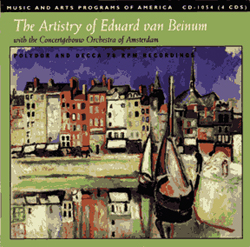
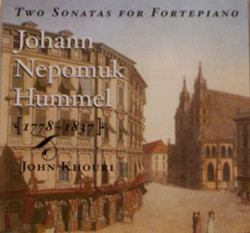
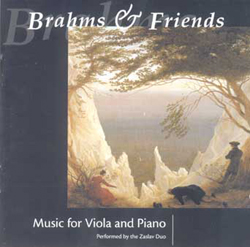
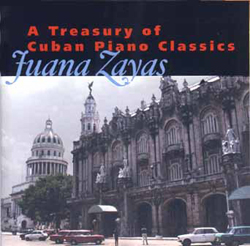
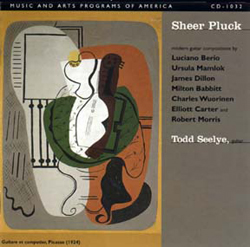
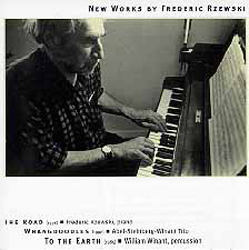
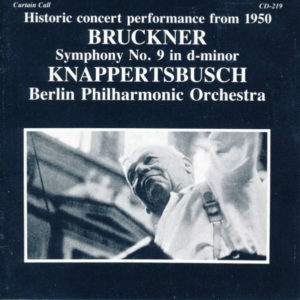
Reviews
There are no reviews yet.